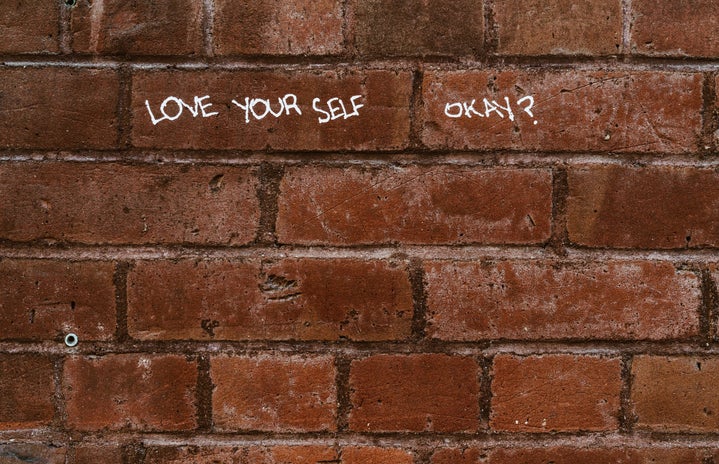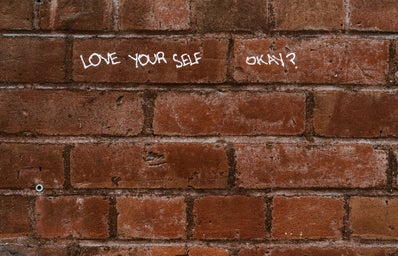I recently found out that my insurance covered a meeting with a nutritionist. I’ve always struggled with dieting and my body image so I thought I should try it out. They had me fill out a 3-day log of everything I ate and drank. I wasn’t really sure what to expect, but I figured she would tell me to eat fewer carbs and eat more fruits and veggies.
Please keep in mind: while I do love pasta and spend a little too much money at Panera Bread, I don’t really eat an excessive amount of carbs and my dietitian even told me that. With the amount of broccoli, spinach, blueberries, and apples I eat, I’m even eating enough fruits and vegetables. It became pretty clear pretty quickly that what I was eating wasn’t really the problem. It wasn’t until I was having my meeting with her last week that I realized that there was no physical issue with what I was putting in my body and instead it was all internalized fatphobia.
One of my biggest take-aways from my meeting had nothing to do with food, and instead with tackling fatphobia; we are so afraid of being “fat” because of old racist stereotypes.
If this comes as a shock to you, you’re not alone. I had no idea why I was so against having bigger thighs, or researching the cost of a tummy tuck. I just knew that I was chubby, and that was not okay.
Immediately following the appointment, I did my research. Sabrina Strings, an associate professor of sociology at the University of California, has spent a great deal of time researching the topic. She even released a book on the subject entitled,
Fearing the Black Body: The Racial Origins of Fat Phobia, (which I’ve since put in my Amazon wishlist). She has become a voice of demolishing fatphobia and through both her book and her various interviews, has played a huge role in educating people about it’s racist roots and inaccuracies that it’s fostered over time.
Back in July, Maddie Sofia with NPR interviewed Strings about what she discovered about the history of fatphobia and her experience in studying it’s racial historical context, (if you haven’t listened to the 12-minute interview, I highly suggest it.) What I learned from the interview was that the growth of the slave trade back in the 1700s allowed French philosophers to develop the stereotype that their African slaves love to eat and therefore they were fat. They felt that Europeans should lose weight to prove their superiority over their slaves.
In the interview Strings states, “they decided to articulate new aspects of racial identity and so eating and body size became two of the characteristics that were being used to suggest that these are people who do not deserve freedom.”
To simplify, old European philosophers demonized both African people and larger bodies, and we are still facing the consequences of these stereotypes. Even today, as a society America views a slender body as a healthy body and a larger body as one that is sick and unwell.
Sofia and String’s interview would also go on to talk about how the Body Mass Index (BMI), the ratio of body height and weight, is a terrible calculation of health and targets African American women. Researchers from the Perelman School of Medicine from the University of Pennsylvania concluded in their research that the BMI chart is an inaccurate measure of body fat content because of a variety of other health factors whether they be genetic, internal, cultural, or environmental.
Strings goes further to explain that, “You might have two people with the same BMI but vastly different life experiences and body composition outside of the simple reality of their weight-to-height ratio, right? And the problem of applying this to Black women in particular is that African American populations – as studies have shown for literal decades, since at least the ’80s – tend to be healthier at heavier weights than white populations. And so that already is an indication that, cross-racially, this is not a very useful tool.”
This means that not only is the BMI system a wholly inaccurate way to measure how much fat is on a person’s body or how “healthy” a person is, but it also is harmful to minority groups. An article from TIME Magazine once wrote “for years, scientists have said that BMI can’t distinguish between fat and muscle, which tends to be heavier and can tip more toned individuals into overweight status, even if their fat levels are low.”
Based on this knowledge, not only are there millions of people using the BMI system who are wrongfully being labelled overweight and obese, but these words, along with the societal pressures of fatphobia have forced flawed body images on a wide group of people.
I can admit that I too have felt like I’m never going to be good enough because of my chubby features. However, I think that recognizing and understanding why and how we perceive larger bodies the way we do will help us to not put down others and ourselves for the shape of our body, understand that a body’s shape and size has a lot more to do with genes, our environment, and a wide variety of other factors than just what we eat and how we exercise.
I still have a lot to learn about being body positive, but I think the first step in conquering a poor body image is recognizing that regardless of your shape or size you are not necessarily more unhealthy or lesser than those around you. I hope that anyone reading this who has felt a similar struggle with their perception of themselves can make positive steps in demolishing fatphobia, starting from within.
Sources (in order of appearance):
https://www.npr.org/transcripts/893006538
https://healthland.time.com/2013/08/26/why-bmi-isnt-the-best-measure-for-weight-or-health/
https://healthland.time.com/2013/08/26/why-bmi-isnt-the-best-measure-for-weight-or-health/



